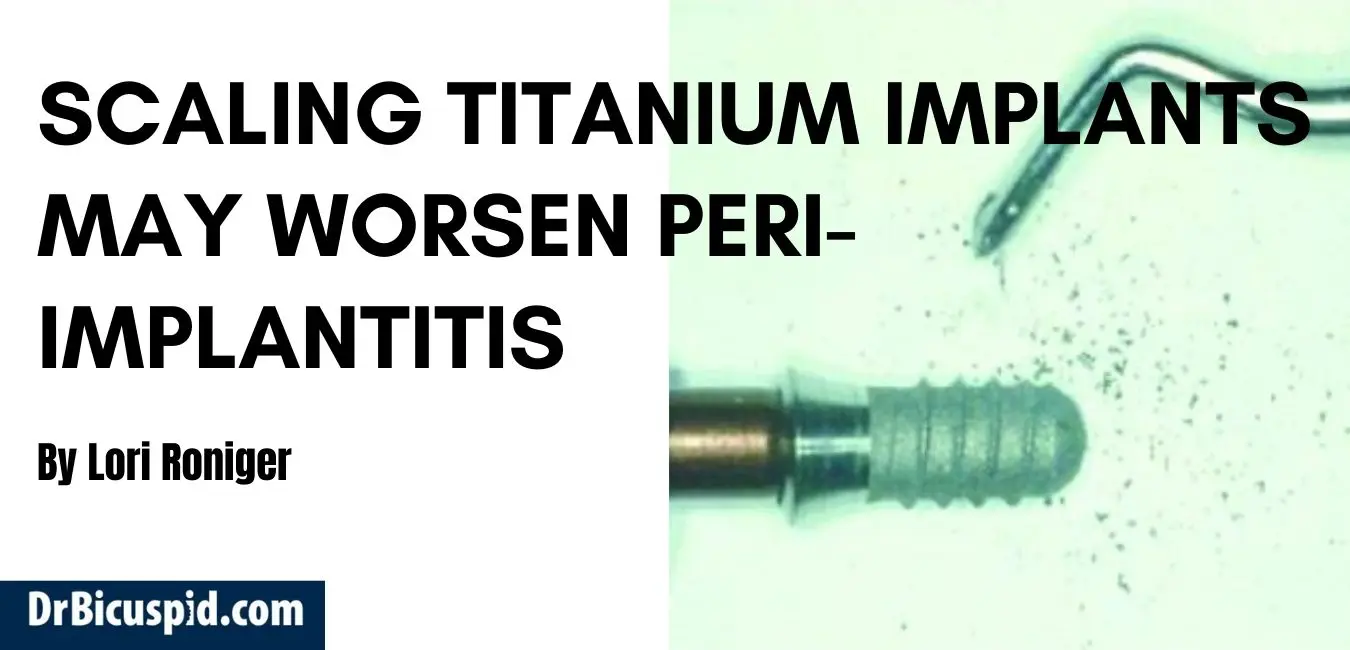All, Whole Body Health
Scaling titanium implants may worsen peri-implantitis
Ultrasonic scaling of titanium (Ti) implants releases particles that not only vary by surface type but aggravate peri-implantitis, according to a new study.
Researchers from Israel investigated whether ultrasonic scaling of dental implants done to manage peri-implantitis releases titanium particles that may induce inflammation and osteolysis. They also explored whether the response of the implants varied based on the amount of surface roughening.
“The results of this study confirm the hypothesis that ultrasonic-produced particles elicit a strong immune and osteolytic response,” Michal Eger, DMD, and colleagues from Tel Aviv University wrote in Scientific Reports (January 6, 2017). “To the best of our knowledge, this report is the first study to describe the potential biological consequences of performing [ultrasonic] scaling on Ti implants.”
Dr. Eger is affiliated with the department of anatomy and anthropology at the Sackler Faculty of Medicine at Tel Aviv University. This study is part of her doctoral research.
Effects of scaling
With an estimated 5 million new dental implants inserted each year worldwide, peri-implantitis is a recent but already major clinical concern and the main cause of long-term implant failure, the study authors noted. It is triggered by specific oral bacteria and involves inflammation that leads to osteolysis around implants. Once the process starts, it can rarely be controlled and often leads to implant loss.

“The results of this study confirm the hypothesis that ultrasonic-produced particles elicit a strong immune and osteolytic response.”
— Michal Eger and colleagues
There is no well-established protocol for treatment, but it begins with mechanical cleaning of the surrounding biofilm using ultrasonic scaling and the use of antiseptic solutions, as well as local and systemic antibiotic administration.
Long-term joint loosening after orthopedic joint replacement has been associated with aseptic inflammation thought to be caused by titanium particles released from the implant surface into the surrounding microenvironment. When released, these particles are captured by circulating monocytes and macrophages. Macrophages engulf titanium particles, which causes them to secrete inflammatory cytokines, such as interleukin 1 beta (IL1β), interleukin 6 (IL6), and tumor necrosis factor alpha (TNFα), which are strong inducers of bone resorption, the authors explained.
Therefore, the researchers sought to investigate if dental implant scaling, designed to prevent peri-implantitis, may actually cause and aggravate the disease’s progression. They examined the release of titanium particles from several titanium disks of varying roughness following ultrasonic scaling.
The researchers considered the level of roughness, since it has been found to be more difficult to prevent and manage peri-implantitis in roughened implants compared with machined ones. Currently, almost all commercially available implants undergo surface roughening, since these surfaces have been shown to be beneficial during the healing stages of implant integration.
The investigators cultured primary bone marrow-derived macrophages for 24 hours with the titanium particles released by scaling of the sandblasted and acid-etched surface, the most common surface treatment used in commercially available dental implants. This mimics the release of particles that occurs during routine cleaning around dental implants. They also conducted tests to examine the relationship of the number of particles, original implant surface, and other factors to the inflammatory response.
The titanium disks studied were either machined, sandblasted, or sandblasted and acid-etched. To measure topographic differences, the researchers analyzed the nanoroughness of the surfaces.
They scaled half of the surface of each disk using a dental ultrasonic scaler and then assessed the effect of scaling using scanning electron microscopy. They also quantified and assessed the differences between the titanium particles that were released from each surface.
They found that the numbers, nanoroughnesses, and chemical profiles, but not the average sizes, of the released particles, differed among the three surface types, with sandblasted disks having the highest quantity of released particles and those that were machined having the lowest quantity.
The researchers found that increasing the number of particles exponentially increased the inflammatory response. Particles from sandblasted surfaces induced the most severe inflammatory response, while those from machined induced the mildest.
They also studied the effect of titanium particles on bone resorption using a mouse calvaria model. The results indicated that particle-induced osteolysis was significantly higher with titanium particles compared with sham controls. Bone loss was dramatically more severe with particles from sand-blasted than sand-blasted and acid-etched disks.
“In our study, [ultrasonic] scaling of Ti surfaces induced the release of particles that stimulated the secretion of pro-inflammatory cytokines,” the authors wrote. “An increase in the expression of IL1β, IL6, and TNFα, among other cytokines, was accompanied by an increase in osteoclast formation and activity, which was either directly or indirectly induced via a paracrine effect on neighboring cells (e.g., osteoblasts). These cytokines have been repeatedly shown to trigger and/or amplify inflammation-induced bone loss.”
Long-term impacts unknown
The authors acknowledge that the study only examined short-term responses to titanium particles and not long-term, chronic effects of exposure.
“However, the dramatic bone loss that was observed in vivo in the presence of Ti particles is unlikely to be reversible,” they wrote.
Follow-up clinical studies are now needed to examine the long-term effects of ultrasonic scaling on roughened titanium surfaces on particle-induced inflammation and osteolysis, they added.
“This study suggests that the biological consequences of implant cleaning procedures have a significant clinical impact,” the authors concluded. “Thus, evaluations of treatment results should concentrate not only on the efficiency of the cleaning and the damage caused to the implant surface but also on the quantity and properties of the released particles.”
Read the full article by CLICKING HERE



Comments are closed.